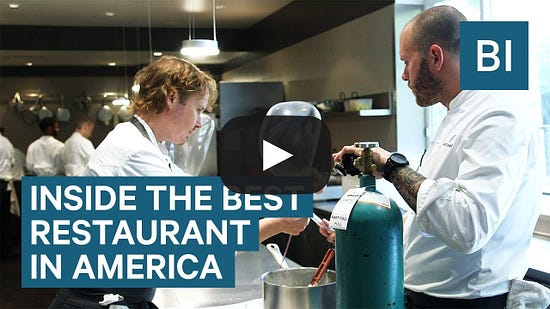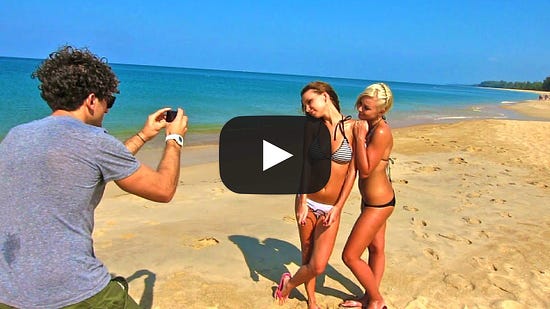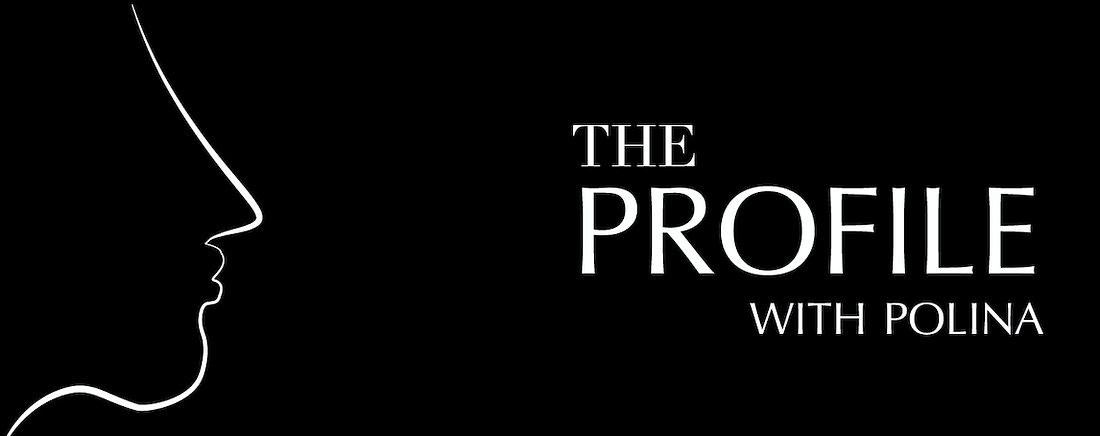Good morning friends!
Coming up with a brilliant idea is the easy part. Bringing it to life is where the real work takes place.
The best artists, writers, and innovators have a creative process that requires rigorous iteration. They cut, edit, slash, rip apart, and start over many, many times before the final version of their work comes to life. It’s frustrating, and it’s beautiful.
My friend Ali recently introduced me to Songland, a show in which undiscovered songwriters pitch their original songs to recording artists. Many of the songs pitched on the show become hits — but not before an arduous workshopping process.
For example, you may have heard Lady A’s song Champagne Night. It took a while to get it there. In the video below, you’ll see the songwriter Madeline who comes in to pitch her song, I’ll Drink to That. After she's done performing, the panel comes up with a totally new hook. On the spot, they come up with the lyric: “We're drinkin' beer on a champagne night.”
“The bones of this song were extraordinary,” says country music singer-songwriter Shane McAnally. “She had the feeling right, but there’s a way to say it that’s more interesting.”

Creativity isn’t only about revision, though. It’s about constant innovation — even in the good times.
Grant Achatz, who's featured in this week's Profile Dossier, is one of the most creative and cutting-edge chefs in America. He founded Alinea, which has been named the best restaurant in the world, in 2005. Alinea is one third laboratory, one third sensorium, and one third theater. A guest is served anywhere between 17 to 24 courses, a meal experience that mirrors chapters in a book. Alinea's most iconic dishes include the pillow of nutmeg air, the black truffle explosion, and the edible helium-filled, floating balloon.
“Every restaurant exists to entertain,” says Achatz. “We want to grab you by the hand and pull you into a great performance.”
Achatz explains he's constantly bombarded with ideas because he views the world through "a kaleidoscope of food." So for him, ideas can come from the most unlikely sources — it could be while listening to song on the radio, watching leaves fall to the ground, or seeing a large-scale painting in a museum. Watch the video below to better understand the way his mind works:

Achatz's greatest competitive advantage is perhaps the fact that he's willing to start over even when things are going well. He's terrified of the complacency that often comes hand-in-hand with great success, so Achatz regularly blows up the entire menu and starts over.
"It's about having a restaurant philosophy where creativity is the priority," he says. "We could have created a greatest hits menu, but I think if we do that we fall into that trap of almost counter-creativity."
Perhaps the most creative period of his life was when he was forced to come up with new ways to develop recipes. In 2008, Achatz was diagnosed with stage-four tongue cancer, and he had to accept that his sense of taste could disappear forever.
He began thinking from first principles once again. He found out that taste relies much more on our eyes and our nose than it does on our tongue. The cancer diagnosis forced Achatz to use his other senses and figure out new ways to push the envelope that ultimately made Alinea even more cutting-edge.
Why is this important? Because it busts the myth that you sit around and wait for creativity to show up. It doesn't. It requires persistence and relentless determination. As Achatz says:
"People like to think the creative process is romantic. The artist drifts to sleep at night, to be awakened by the subliminal echoes of his or her next brilliant idea. The truth, for me at least, is that creativity is primarily the result of hard work and study."
YouTuber Casey Neistat is the king of creative storytelling. He's made videos for clients like Samsung, Adobe, Google, and Mercedes-Benz that evoke emotion and humanize the brand. His latest video for Nike has been called "the best branded story ever told."
Nike hired Neistat to make a commercial for its Nike FuelBand featuring the slogan "Make It Count." But at the last minute, he and his buddy film editor Max went rogue and set off on a journey around the world using Nike's money and advice to "Make It Count." It became Nike's most-watched video of all time.
It's creativity at its finest.

So what's Neistat's secret to creative success? Learning to push through the hopeless, gut-wrenching troughs of frustration and boredom and stress. Even though the first movie Neistat ever made 20 years ago was terrible, he says the "doing" is the most crucial part of the creative process. In 2015, he set a personal challenge to vlog every single day for over a year.
He says:
"To sit around and say, 'I’m not motivated, so I can’t do anything,' to me is the same thing as being like, 'I’m so hungry, I can’t eat.' The only way you’re going to alleviate your hunger is to eat some food. The only way to fix your motivational problem is to do something.”
Because if you sit around waiting, your muse will never come. Remember, creativity is a practice — not a state.
THE PROFILE DOSSIER: On Wednesday, premium members received The Profile Dossier, a comprehensive deep-dive on a prominent individual. It featured Grant Achatz, America's most creative chef playing mind games. Become a premium member and read it here.
📚 LESSONS FROM THE PROFILE: I compiled the best columns from The Profile into a single living e-book. In it, you'll learn about the science of loneliness, the secret to long-lasting relationships, and what it means to build a company during a pandemic. Check it out it here.
PODCASTS: I still cringe at hearing the sound of my voice on any podcast, but I did two really fun ones last week. 1) On the Paterson podcast, we chatted about the importance of taking action in times of great fear and uncertainty, and 2) On the Student Mindset podcast, we talked about normalizing your interests by becoming part of the right community.
—
PROFILES.
— The man who killed Hollywood [**HIGHLY RECOMMEND**]
— The busiest woman in sports media
— The geniuses of home organization
— The sports gambling hustler
— The man racing to invent a rapid at-home COVID-19 test
— Hollywood's biggest activist
— The tennis superstar who keeps apologizing
— The queen of the internet
— The private companies helping you vote in 2020
PEOPLE TO KNOW.
The man who killed Hollywood: Reed Hastings, the co-founder and co-CEO of Netflix, is having quite the year. With a record 160 Emmy Award nominations, Netflix has eclipsed the long-dominant HBO, and it got more Oscar nods than any other media company. It has added almost as many customers in the first six months of the year as in all of 2019. Oh, and its sales are up 25% year-over-year. Meet the mastermind behind one of the most disruptive tech companies in 2020. (Forbes)
“We’re a creative company. It’s better to organize around flexibility and tolerate chaos.”
The busiest woman in sports media: ESPN analyst Mina Kimes turned her love of football into a budding commentary empire in the sport. Along with regular appearances on ESPN’s “Around the Horn” and “Highly Questionable,” the 35-year-old Kimes hosts a weekly football podcast, is a daily analyst on ESPN’s newly cast “NFL Live” and is the Rams color commentator for preseason games. Here's how Kimes became the face of NFL analysis. (Los Angeles Times)
“Mina Kimes loves football more than I love anything. Her love of football is genuinely terrifying.”
The geniuses of home organization: You've probably seen the Home Edit all over your Instagram feed. The Nashville-based home-organization company is now making a splash in the A-List celebrity world with the Kardashians, Reese Witherspoon and Gwyneth Paltrow — all of whom are not only clients but Home Edit evangelists. Co-owners Clea Shearer and Joanna Teplin can turn your messy closet into an aesthetic that is often summed up as "Pinterest organization porn." (The New York Times)
“Form plus function equals magic.”
The sports gambling hustler: Dave Oancea, who goes by "Vegas Dave," recently sold the most expensive baseball card in history for a whopping $3.9 million. Oancea is a notorious gambling social media influencer, known for selling picks on which team will win a given game. He's got a shady hustle and an even shadier past, but this profile digs deep to expose his legal troubles and mind-boggling obsession with Birkin bags. This one is cringe-worthy. (Forbes)
“If you want to jump on the money train, I can help you."
The man racing to invent a rapid at-home COVID-19 test: Jonathan Rothberg was dumbstruck by the U.S. government’s failure to marshal its resources in preparation for a comprehensive clinical-testing regime. So he took it upon himself to create a rapid, at-home COVID-19 test. Meet the entrepreneur who sees a future in which self-testing is just another part of our everyday morning ritual. (The New Yorker)
“In so much time, we couldn’t get anything done as a nation. That makes me feel really terrible—I just wanted kids to have a normal experience.”
Hollywood's biggest activist: Over the years, Jane Fonda has been increasingly raising her voice on issues around climate change. For four months, she became the star of Fire Drill Fridays, a climate protest in front of the Capitol. She got arrested five times, and checked to see whether the black plastic handcuffs used by police were recyclable. Here's why Fonda refuses to back down. (The New York Times)
"What are we going to do about the banking system, the redlining, the mortgages, the policing, all of those things that make it impossible for Black people to lift themselves up?”
The tennis superstar who keeps apologizing: At just 33, Novak Djokovic is on track to become the greatest tennis player of all time. But his latest outburst at the U.S. Open is just one incident in a long line of unpredictable behavior. Time after time, he messes up and promptly apologizes, begging for forgiveness. Could his troubling temper hold him back? (GQ)
"He is the superhero, and the supervillain, of his era."
The queen of the internet: Chrissy Teigen is taking time off social media at the request of her therapist. "People think I'm tough, but I'm such an empath, and I take on other people's pain and sadness as my own," she says. Teigen, who's currently pregnant with her third child, is busy running two companies: her lifestyle brand Cravings as well as her production company Suit & Thai Productions. Here's what she's been up to this year. (Marie Claire)
“I’m having a hard time being any kind of mogul and running companies because it’s hard for me to work on, or even talk about, two things at once."
COMPANIES TO WATCH.
The private companies helping you vote in 2020: The mail-in ballot industry is a massive business — and it's also absolutely crucial for a fair election. In the months leading up to the 2020 U.S. election, a number of private companies are scrambling to make sure you can securely vote from home. Our democracy depends on these businesses getting it right. (California Sunday Magazine)
“Our vision is to restore confidence in the electoral process."
This installment of The Profile is free for everyone. If you would like to get full access to all of the recommendations, including today’s audio and video sections, sign up below.
AUDIO TO HEAR.
Guy Raz on getting through the darkness: Guy Raz has interviewed countless entrepreneurs in his time as the host of the podcast, How I Built This. When he begins his interviews, he asks his subject to surrender to their vulnerability. In this interview, he's the one who surrenders. Raz discusses his ongoing battle with depression and how he's learned to not let it take over his life.
Casey Neistat on brand creativity: In this episode, Neistat explains how he got the idea for the "Make It Count" Nike video. He had pitched the brand on one idea, but at the last minute, he decided to go rogue, take the whole budget, travel the world, and create a totally different film. "When I look back, I think, 'Who's the maniac who wrote me this big, fat check and let me do my thing?' Like who got that approved," Neistat asks. "You realize that's what makes Nike great." Here's why Neistat's greatest work requires great trust by the brands he partners with.
Kanye West on navigating the turmoil: Kanye West is still upset because he believes he got snubbed by Forbes on the magazine's 2019 billionaires list. In this podcast, West talks about when he really reached billionaire status, how his hospitalization inspired him to start a church, and shares details on his "Birthday Party" presidential campaign. What a conversation.
VIDEOS TO SEE.
Miley Cyrus on the necessity of pain: In the last few years, Miley Cyrus has undergone emotional pain after her very public divorce, and she's still learning how to deal with the physical and mental pain that came as a result of a childhood head injury. Ironically, she says, a lot of beautiful art can emerge from severe trauma. "It's almost as if your entire life becomes art," she says.
Thomas Keller on the true meaning of success: Restaurateur and chef Thomas Keller says what kept him motivated in his career were the tiny successes in the midst of the many, many failures. He didn't have money or a job when he fell in love with the idea of purchasing a restaurant. It took Keller 19 months to raise capital to buy The French Laundry. "My biggest asset was my ignorance," he says. "It played a really important part in my success."
The businesses cashing in on heartbreak: In the United States, the divorce business is a $50 billion-dollar industry. The reporter in this documentary speaks to one of New York's top divorce lawyers, a Catholic psychiatrist, and a divorce party planner who throws "reverse wedding parties." Take a look into the billion-dollar heartbreak business complex.
Members receive the best longform article, audio, and video recommendations every Sunday. Join the club by signing up below:

